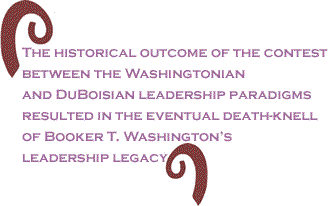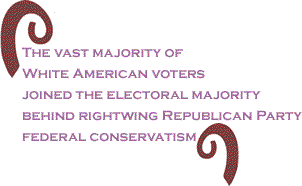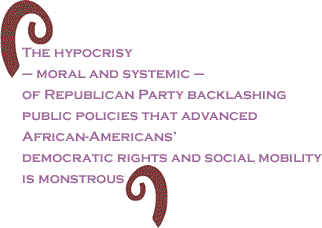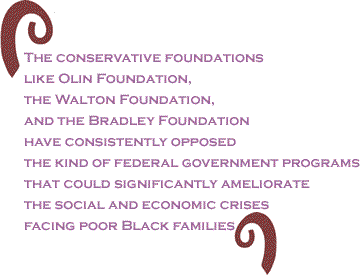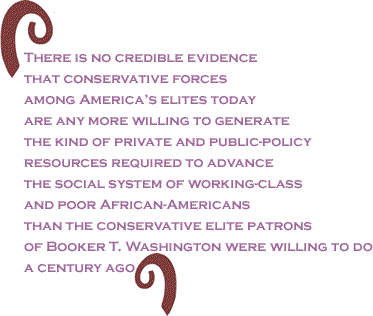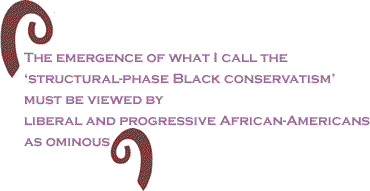
|
|||||||||||||||||||||
 |
|
I commenced Part I of this article by reflecting on the generic question that engaged the small sector of leadership and intelligentsia personalities available to African-Americans at the dawn of the Emancipation Era after the Civil War. Namely: "How do you lead the formerly enslaved Negro American?" I then proceeded to delineate the core ideas and political proclivities that constituted what I call the two major competing "Black leadership paradigms" that held sway among Negro Americans as the late 19th century closed and the 20th century dawned. Those two major competing "Black leadership paradigms" were identified with the intelligentsia personalities of Booker T. Washington of Tuskegee Institute in Alabama, and W.E.B. DuBois of Atlanta University in Georgia. There is probably still no better graphic characterization of the competing Washingtonian/DuBoisian leadership paradigms at the dawn of the 20th century than the deft and acute one made by African Methodist Episcopal Bishop Reverend Ransom, at the second gathering of the Niagara Movement in 1906 in Harpers Ferry, Virginia, the 100th Anniversary of which will be commemorated by the Association of African American Life and History and other groups at Harpers Ferry in the fall of 2006. As the great Bishop Ransom put it:
In the remainder of Part I of this article, I delineated the developmental trajectory of the competing Washingtonian/DuBoisian leadership paradigms from the launching of the 1905 Niagara Movement into the 1920s and 1930s.
In Part II of this article, I want to discuss two things. First, I discuss the character of the post-World War II political patterns at the federal level of American governance that enabled the militant phase of the Civil Rights Movement to gain legislation against public segregation and disenfranchisement of African-Americans. Second, I discuss the cynical massive endeavor (sometimes stealth-designed) by today's national-level Republican Party-mediated American power class to fashion what I call "the revival of a neo-Washingtonian Black conservatism." This Republican Party-mediated rightwing elite quest to institutionalize a post-civil rights era Black conservatism - spawned in the early 1980s - was initially channeled through Black academics like Thomas Sowell (economist), Shelby Steele (literary studies), Walter Williams (economist), Anne Wortham (sociologist), and Glenn Loury (economist). And since the 1990s a second layer of rightwing Black academics has been fostered as sculptors of a post-civil rights era Black conservatism, such as Carol Swain (political scientist), Alan Keyes (political scientist), John McWhorter (literary studies), Randall Kennedy (law scholar), Orlando Patterson (sociologist), K.A. Appiah (philosophy scholar), and Roland Fryer (economist), to mention just a prominent few. Civil Rights Movement Displaces Washingtonian Leadership 1950s to 1990s It is important to keep in mind that during the long contest between the Booker T. Washington accommodationism leadership perspective and W.E.B. DuBois's civil rights activism perspective, followers of the DuBoisian perspective did not surrender the leadership sphere of Black civil society advancement to the followers of Booker T. Washington's accommodationism, but rather the followers of DuBois's leadership paradigm made major contributions to Black communitarian or civil society advancement during the era between the two World Wars. Accordingly, this historical outcome of the contest between the Washingtonian and DuBoisian leadership paradigms resulted in the eventual death-knell of Booker T. Washington's leadership legacy. Why did this historical outcome happen? It happened because of the tenacity of White supremacist orientations and patterns in 20th century American society. One consequence of this was reflected in the fact that Booker T. Washington's power-class patrons among the conservative segment of America's White elites failed miserably in their patron obligation. Which is to say, they failed in their purported patron obligation - in their elite-class promise - to make available to the Washington leadership camp that degree of job-market and education resources capable of viably assisting African-American social organization advancement. The fact of the matter is that by the 1940 Census, some 90% of African-Americans were still in the ranks of weak working-class and poor households, with barely 10% of African-Americans residing in middle-class households.
In short, the conservative White elites had defaulted on their compromise arrangement with the Booker T. Washington accommodationism leadership paradigm. Put more bluntly, the Washington leadership paradigm was betrayed by White American conservatism. During the period from the 1890s to the post- World War II era, there is no serious historical evidence that elites in the ranks of White American conservatism who bargained with the Booker T. Washington leadership sector ever had serious intentions for assisting Black people - via the Washingtonian leadership paradigm - to forge viable paths to social organization capability and social class viability in American life. Accordingly, when some degree of serious development toward viable social organization and social class mobility for African-Americans did finally take place in the post-World War II era, this occurred during the 1960s under the national leadership of the liberal sector of the Democratic Party, during the federal administrations of President John F. Kennedy and President Lyndon B. Johnson. During the 1950s and 1960s the African-American
leadership heirs of the DuBoisian civil rights activism leadership
Unfortunately for African-Americans, however, a sustained federal government use of affirmative action policies on behalf of advancing Blacks to social-mobility parity - or something near that - was rendered impossible when full-fledged rightwing Republican Party conservatism dominated American governance following the 1980 election of President Ronald Reagan onward. The vast majority of White American voters joined the electoral majority behind rightwing Republican Party federal conservatism (under Reagan, President George H. Bush, and President George W. Bush), a White voter majority that was clearly motivated by a fierce opposition to early Democratic Party-initiated federal affirmative action policies on behalf of African-Americans. This long period of White voter antipathy to affirmative action policies was both ironic and hypocritical. Why do I say this? Because when proactive federal policies to assist White working-class upward mobility were launched in a limited way in the 1920s and then extensively under President Franklin Roosevelt's and President Truman's New Deal/Fair Deal administrations in the 1930s into the 1950s, Black folk were pushed-aside, ignored. The almost total beneficiaries of these federal-assisted social mobility policies were White Americans, with African-Americans, either through de facto or de jure practices, excluded from them—a situation of "affirmative action for whites," as the Columbia University historian Ira Katznelson labels it in his important new study When Affirmative Action was White: An Untold History of Racial Inequality in Twentieth-Century America (New York: Norton, 2005).
Be that as it may, by the 1990s the affirmative action policies that President Johnson's administration put in place at the federal level had a positive impact deep enough into the 1970s - reinforced somewhat by the one-term Democratic administration of President Jimmy Carter - translated into important social-mobility advancement for African-Americans. Also commencing under President Johnson's administration and continuing thereafter, the political status of African-Americans was fundamentally altered. By the 1990s when a liberal Democratic federal administration under President Bill Clinton held sway, African-Americans' new political development was represented most prominently in the 8000-plus Black elected officials nationwide - as well as perhaps 80,000 Black public civil servants and technocrats - who functioned in administrative and decision-making roles in counties, towns, cities, states, and the United States federal government. Important advancement in African-Americans' social-mobility status by the 1990s was represented by the fact that perhaps 40% of Black households had entered middle-class ranks and 25% had entered stable working-class ranks. This meant that some 65% of Black households attained by the 1990s what I call the "mobile-stratum," while some 35% of Black households remained locked in what I call the "static-stratum." It was, unfortunately, this persistent "static-stratum" among Black households which remained the Achilles' Heel, so to speak, in Black American society. However, by the 1990s the static-stratum Black households constituted the social breakdown sphere of African-American society, riddled by broken families (mainly female-headed) and the concomitant high rates of teenage births and unwed mothers. Today some two-thirds of Black children are born out of wedlock and nearly half of all Black children living in single-parent households are poor. This situation, in turn, has translated into broad disarray among weak working-class and poor Black youth, as reflected in high crime rates. As the columnist Bob Herbert reported in the New York Times (December 26, 2005) - "Nearly a third of black men in their 20's have criminal records, and 8 percent of all black men between the ages of 25 and 29 are behind bars." In a follow-up column on what I call the Achilles' Heel of African-American households, Bob Herbert reported in the New York Times (January 30, 2006) on "The Lost Children." He quotes the progressive urban analyst Gary Orfield, professor at the Harvard Graduate School of Education, as follows: "Only about a twelfth of the Latino kids and maybe a sixth of the black kids are getting college degrees. The rest of them aren't getting ready for anything that's going to have much of a future in the American economy." Herbert then concludes his column on a grim and depressing note:
But these Achilles' Heel features of African-American life by 1990s onward do not vitiate the major citizenship rights and social mobility advancement achieved by Blacks through the civil rights activism leadership approaches associated with W.E.B. DuBois's sector of the 20th century African-American leadership. Had the Booker T. Washington leadership methodology prevailed among African-Americans during the 20th century, it would not, I believe, have translated into the citizenship rights and social mobility advancements achieved by the post-World War II Civil Rights Movement. The conservative sector in White American society that favored the Booker T. Washington leadership methodology among African-Americans, was unwilling to use the instruments of American federal government and public policy in the manner that the Democratic Kennedy and Johnson administrations did, to give Blacks equal voting rights and to end legal public segregation.
Indeed, it is a quite cynical facet of American history that when the conservative sector of American national leadership gained a long period of electoral success from the election of President Ronald Reagan in 1980 onward - interrupted only by two presidential administrations under the Democrat Bill Clinton, 1992-2000 - the conservative Republican-controlled Congress and Executive adopted a cynical politics of backlashing and race-bating the Democratic Party-initiated public policies that advanced African-Americans' political rights (e.g., Voting Rights Act of 1965) and social mobility (e.g., War on Poverty policies and affirmative action policies). From Reagan's administration down to the current Bush administration, the conservative Republican Party forces have attached the rightwing label of "intrusive government" to the Democratic Party public policies that advanced African-Americans' political rights and social mobility status. The hypocrisy - moral and systemic - of Republican Party backlashing public policies that advanced African-Americans' democratic rights and social mobility is monstrous, in light of the massive use of public policy by Republican administrations since 1980 to advance corporatist economic, wealth, and institutional dominance - a veritable oligarchic hegemony - in today's American society. And, mind you, this corporatist oligarchic/plutocratic hegemony in today's America is mind-boggling. We can see this, for example, in the fact that by 2004 the average top corporate executive earned more than 500 times the average American annual income of $35,000, a pay-gap ratio between corporate executives and average family income permitted in no other capitalist democracy because public policies are put in place to prevent it. The corporate executive/average family income-gap ratio as of 2004 was 11 to 1 in Germany, 10 to 1 in Japan (the 2nd and 3rd largest economies), 16 to 1 in France, 20 to 1 in Canada, and 25 to 1 in Britain. (See Gretchen Morgenson article in New York Times [January 25, 2004]). Put another way, the top 1% of Americans (29,000 persons) made as much as the bottom third of Americans. Be that as it may, the monstrous plutocratic shift in America's wealth to the corporate tier did not have any negative effect on the Republican Party political clout. Quite the contrary. From the late 1970s onward, the cynical but skillful Republican Party-mediated propaganda of backlashing liberal policies that advanced the citizenship rights and social mobility of African-Americans translated into electoral majorities for Republicans among White voters. This was so in the presidential elections for 1980, 1984, 1988, 2000, and 2004, and in electoral majorities among White voters in House of Representatives and Senatorial elections from 1994 to the present. As Thomas Frank relates in his path-breaking book What's the Matter with Kansas? (2003), this electoral dynamic represents an unprecedented alliance between a plutocratic corporatist class and a conservative ideologically brainwashed middle-class and blue-collar White American electorate. Of course, the public policy consequences of this situation for most African-American citizens, here in the early 21st century, fall unmistakably on the conservative and reactionary side of the American political spectrum. Republican Revival of a Neo-Washingtonian Black Conservatism Commencing in the early days of the Reagan administration,
Republican Party-linked conservative forces launched an endeavor
to revive the legitimacy of a Booker T. Washington-type conservatism
among African-American citizens. This was a broad-based endeavor
by American conservative forces to present a neo- A unique feature of this Republican Party-led conservative revival of the Washington leadership paradigm was the recruitment of talented conservative Black intellectuals to perform the function of articulating a neo-Washingtonian ideological Black conservatism. Since the early 1980s, a cadre of conservative Black intellectuals has evolved to perform this function, intellectuals such as Thomas Sowell (economist), Shelby Steele (literary studies scholar), Walter Williams (economist), Robert Woodson (neighborhood organizer), Glenn Loury (economist), Alan Keyes (political scientist), John McWhorter (literary studies scholar), Carol Swain (political scientist), to mention just a few key personalities. Several Republican Party-linked conservative foundations such as the Olin Foundation, the Heritage Foundation, and the Bradley Foundation, have allocated funds through Robert Woodson's neighborhood development organization. But Robert Woodson's activities are little more than pilot projects in inner-city Black neighborhoods, and cannot be viewed as serious contributions toward turning around the crises facing inner-city poor Black communities. Indeed, the conservative foundations like Olin Foundation, the Walton Foundation, and the Bradley Foundation who allocate funds to the type of neighborhood projects undertaken by conservative Black professionals, have consistently opposed the kind of federal government programs that could significantly ameliorate the social and economic crises facing poor Black families. It is especially important to mention that Republican Party-linked conservative groups seeking a revival of the Booker T. Washington-type leadership conservatism among African-Americans have readily expended financial resources on propagandistic projects focused on African-American audiences. For example, there are today nearly a dozen Black conservative talk radio stations that target African-American communities in major metropolitan areas, including Philadelphia, Baltimore, Denver, Atlanta, and Detroit.
Republican Party-linked conservative forces have also allocated sizable funds for Black conservative publications, such as the launching in 1994 of the bimonthly conservative magazine Destiny. Leading Black conservative intellectuals such as Thomas Sowell (of the Hoover Institution) and Walter Williams (of George Mason University) are members of Destiny's governing board. And, of course, we should mention the now infamous case of the Bush administration's clandestine financing of the prominent Black television commentator and newspaper columnist, Armstrong Williams, to speak and publish reports favorable to the Bush administration's views on the "No Child Left Behind" national education policy. Armstrong Williams's columns appeared in African-American weekly newspapers nationwide, such as the Philadelphia Tribune, the Pittsburgh Courier, the Baltimore Afro-American, and the Chicago Defender. The Republican Party-led quest to revive a Booker T. Washington-type leadership conservatism among African-Americans has also involved the allocation of financial and institutional resources to Black political processes. At the center of this development was an organization called the Black Alliance for Educational Options (BAEO), which was established in the late 1990s by Dr. Howard Fuller, a conservative Black school superintendent in Milwaukee who favored school vouchers as an education strategy for inner-city Black children. By 2000, the BAEO had fashioned an alliance with another conservative Black organization called Black America's Political Action Committee (BAMPAC), whose head figure was Alan Keyes, a conservative television talk-show host (MSNBC Television) who ran a strange campaign for the Republican Party presidential nomination in 1996. Functioning either alone or jointly, both of these conservative Black organizations have demonstrated very good skills at raising funds from conservative grantees, such as some $900,000 seed money provided BAEO by the Walton Foundation, some $1.7 million provided the BAEO by the Bradley Foundation, and the $2 million political action budget claimed by Alan Keyes' BAMPAC. The Olin Foundation and the Richardson Scaife Foundation also provided several hundred thousand dollars to a conservative Black political consultant, Phyllis Meyers Berry, to form the Center for New Black Leadership in the l990s. (See BC's April 5, 2002 article, "Fruit of the Poisoned Tree.") Amoralism of American Conservatism Interface with Blacks Of course, it remains to be seen whether the forgoing endeavors by the Republican Party and conservative elites to revive a Booker T. Washington-type conservative leadership sector in African-American life will translate into viable outcomes for the conservative forces in American society. One thing about this Republican Party-led neo-Washingtonian conservative maneuvering in African-American leadership circles is quite clear, however. Namely, that there is no credible evidence that conservative forces among America's elites today are any more willing to generate the kind of private and public-policy resources required to advance the social system of working-class and poor African-Americans than the conservative elite patrons of Booker T. Washington were willing to do a century ago. In light of the resources required to advance the life-chances of poor African-American households, the funds spent by conservative foundations on conservative Black leadership organizations like BAEO, BAMPAC, and the Center for a New Black Leadership might be classified by the street-term "chump change." But should America's conservative elites today miraculously discover the moral fiber necessary to end White America's long-standing state of denial of our country's horrendous injury to African-Americans under American slavocracy and White supremacist practices, it is conceivable that inventive elements among the ranks of American conservatism might evolve from their current reactionary conservatism toward something like, at the very least, a new proactive conservatism. They might evolve, that is, from a cynically manipulative plutocratic-oligarchic conservatism toward a problem-solving conservatism, a kind of helping-hand conservatism, if you will.
For example, this kind of morally humanitarian transformation among today's plutocratic conservative elites might occur when wealthy conservative foundations like Bradley Foundation, Walton Foundation, Richardson Sciafe Foundation, and others, design and fund scholarship programs for high-achieving working-class and poor African-American youth, fund programs to strengthen teacher-training for inner-city public schools, fund programs to advance science and math education in inner-city schools, or funds to expand significantly Habitat for Humanity homes for poor Black families, and for poor American families in general. If such a morally humanitarian transformation ever occurs in the ideological character and politics of today's plutocratic conservative elites in American life, today's heirs of the DuBosian leadership legacy among African-Americans might have a rare opportunity to applaud American conservatism. Unfortunately, however, no serious opportunity to applaud American conservatism has ever been available to proponents of the DuBoisian leadership legacy among the African-American intelligentsia during the century since the young W.E.B. DuBois and his associates launched the Niagara Movement in 1905. Given this indisputable fact about the American conservatism tradition's interface with African-American life, it is a bizarre phenomenon that, here in the first decade of the 21st century, there is a cabal of Black academics and professionals trumpeting "Black conservatism," manipulating words and ideas on the supposed value of oligarchic and plutocratic American conservatism for African-Americans. Conclusion: Rise of Structural-Phase Black Conservatism It should be noted, finally, that the crucial investigative journalism by the staff and editors of The Black Commentator have informed us regarding what might be called a new "structural-phase Black conservatism." This is something quite beyond and more systemically lethal than the "academic-phase Black conservatism" associated with Black intellectuals like Thomas Sowell, Shelby Steele, Walter Williams, and Glenn Loury. Basic to this "structural-phase Black conservatism" has been the slow-but-steady penetration of the ranks of the Black political class at the federal level (via a sector of the Congressional Black Caucus) by Republican Party-linked corporatist political money.
Our understanding of how this facet of the "structural-phase Black conservatism" translates into devastating public policy consequences for African-American citizens has been kindled by the The Black Commentator's editors in Issue 164 (Dec. 20-26, 2005), where they describe how Republican Party-linked corporatist political money "has spread into the Congressional Black Caucus (CBC)."
Be that as it may, it is, I believe, fortunate for African-Americans that, by the middle of the 20th century, the DuBoisian leadership approach to developing the formerly enslaved Negro American population into both citizenship equality and human rights equality trumped the Booker T. Washington-type leadership paradigm. For those African-Americans on the liberal, progressive, and leftist side of the American political spectrum here at the dawn of the 21st century, the thought that the Washingtonian leadership paradigm did not trump the DuBoisian leadership paradigm during the 20th century is invigorating. The primacy of the DuBoisian leadership paradigm was a monumental achievement for African-Americans. However, the emergence of what I call the "structural-phase Black conservatism" must be viewed by liberal and progressive African-Americans as ominous, at least, and nightmarish at worst. I say this because of what is known regarding the skillful maneuvering of stealth-oligarchic type political praxis by today's Republican Party-linked elites. In a New York Times (January 30, 2006) article titled "Grass-Roots Organizers Fueled Effort to Shift Court to the Right," we were recently informed of the stealth-dynamics underlying the Republican Party-linked elites' oligarchic-type political praxis. The article quotes a conservative legal scholar at Pepperdine University, Douglas Kmier, in regard to the ascendance to the United States Supreme Court of arch conservative jurists John Roberts and Samuel Alito as follows: "It is a Reagan personnel officer's dream come true. It is a graduation. These individuals [Roberts and Alito] have been in study and preparation for these roles all their professional lives." The New York Times article then details how, through a veritably subterranean world of the quasi-secret elite law organization called the "Federalist Society" (it refuses to make public its membership, for example), Reagan White House lawyers - led by Attorney General Edwin Meese - launched the goal of rightwing ideological hegemony over America's federal courts.
If even a small-scale variant of this stealth oligarchic-type political praxis is applied by the Republican Party-linked power class to fashioning a broadening of what I call the "structural-phase Black conservatism," the political consequences - and social status consequences too - for African-Americans would be nightmarish. In order to prepare future African-American leadership processes for such an ominous development, a new stage of ideological and political innovation on the DuBoisian leadership legacy should be at the top of the agenda of today's African-American intelligentsia. The upcoming convention of major Black political and professional organizations in Gary, Indiana, could make a significant contribution in this regard. Martin Kilson is Frank G. Thomson Professor of Government Emeritus, Harvard University. His forthcoming book is The Making of Black Intellectuals: Studies on the African-American Intelligentsia (Forthcoming 2006). |
|
| Home | |
Your comments are always welcome. Visit the Contact Us page to send e-Mail or Feedback or Click here to send e-Mail to [email protected] e-Mail re-print notice
If you send us an e-Mail message we may publish all or part of it, unless you tell us it is not for publication. You may also request that we withhold your name. Thank you very much for your readership. |
|
| March
2, 2006 Issue 173 |
||||||||||||||
|
||||||||||||||
|
||||||||||||||
| Printer Friendly Version in Plain Text or PDF format. Download free Adobe Reader. | ||||||||||||||
 |
||||||||||||||
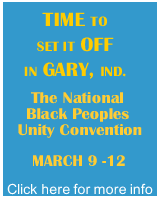 |
||||||||||||||
 |
||||||||||||||
 |
||||||||||||||
| |
||||||||||||||
| |
||||||||||||||
























